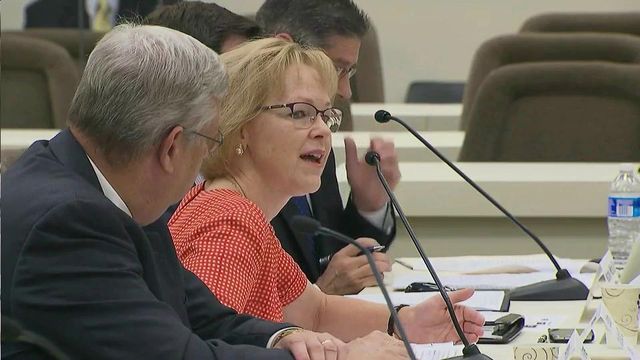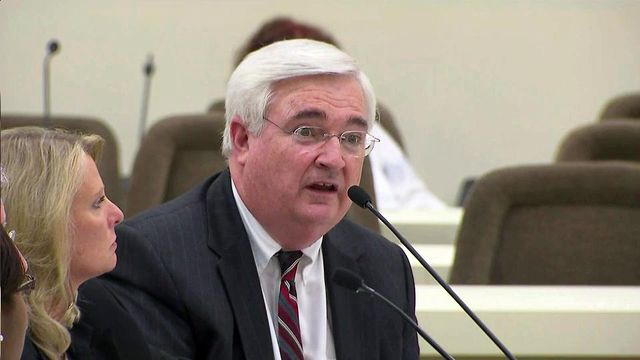Lawmakers grill DHHS over contract
State lawmakers spent much of Tuesday grilling DHHS Secretary Aldona Wos and her staff about a $6.8 million contract with turnaround consultants Alvarez and Marsal.
Posted — UpdatedThe firm, contracted to help upgrade operations at North Carolina's Medicaid division, has worked with other states facing escalating costs and outdated bureaucracies. It received a no-bid, sole-source contract to assist the Division of Medical Assistance with business operations, organization and "leadership support."
DHHS first entered into a $3.2 million contract with Alvarez and Marsal in February. Despite skepticism from lawmakers, the agency doubled the size and cost of the deal in June, adding services such as data analytics and fiscal modeling.
Tuesday's morning meeting focused on state contracting law, an overview of restructuring at DHHS and a detailed presentation from the contractor about the scope of its services, which Medicaid director Dr. Robin Cummings called "key and indispensable" to the program's improved financial performance in the 2013-14 fiscal year.
“The Medicaid budget finished the year in the best shape it has ever been in the last five years," Wos said.
DHHS officials argued the contract was necessary, saying the agency is simply too understaffed to fulfill its many missions and be responsive to lawmakers' requests for data.
DHHS human resources chief Mark Gogal said the agency still faces "double-digit turnover" in key staff, mainly because of "salary pressure."
According to Gogal, the state's salary ranges for positions from direct-care staff to medical directors and other professionals are at least 20 to 30 percent under market salaries in the private sector. He said the agency would "have to get more competitive" to attract and retain staff with needed skill sets.
"That doesn’t mean you have to be above the market, but you’ve got to at least get to the market," Gogal said.
In the meantime, DHHS contract compliance officer Mark Oglesby said Alvarez and Marsal offered much-needed expertise that could get to work quickly. The firm had worked with the state as a subcontractor on another contract.
“At the time of this contract, there was a significant need,” Oglesby said. "There was a quick start – a jump if you will, an efficiency.”
Oglesby said the sole-source contract followed all proper procedures and met all requirements. “We stand behind that recommendation.”
Openly skeptical lawmakers asked what other firms might have been able to meet the need and asked repeatedly whether other firms had been considered. DHHS officials couldn't give a clear yes or no, but Alvarez and Marsal managing director Dr. Melissa Glynn said her firm is "unique" in the combination of services it provides.
Sen. Floyd McKissick, D-Durham, asked Glynn what the firm's hourly rate would work out to be. Glynn said she didn't have the number offhand but would get it to him. McKissick said after the meeting that he believes it's around $483 an hour.
Wos defended the deal, pointing out that $7 million is a tiny fraction of her agency's $18 billion annual budget and that it's only one of more than 1,500 contracts DHHS currently holds.
"We had an emergency in the department," Wos told lawmakers. "We had to figure out how to get our work done. We succeeded in that.
"We are making progress," she said. "It's a process. There is still much work to be done."
The questions became much sharper during a presentation by the firm's Rudy Dimmling, who is currently serving as the state's Medicaid Finance director.
Dimmling said he is working on a better comprehensive tool for forecasting the state's Medicaid budget, using Microsoft Excel. Dimmling called the spreadsheet program a "robust tool," but Sen. Ralph Hise, R-Mitchell, who said he is certified in Excel and other programming, said that concerned him.
"You will reach a point where it will break," Hise warned.
McKissick commented that, by his calculations, the state is paying about $800,000 a year for Dimmling's services. Dimmling didn't dispute the number.
"What do you think we would pay if we had an in-house private-sector person handling the responsibility you’re handling today?" he asked the consultant.
Dimmling declined to speculate, but Gogal said the state's job posting for the DMA Finance director has an annual salary of up to $175,000.
"I hope we can find someone expediently to take on those responsibilities," McKissick answered.
Related Topics
• Credits
Copyright 2024 by Capitol Broadcasting Company. All rights reserved. This material may not be published, broadcast, rewritten or redistributed.






